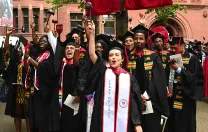As prepared for delivery. For Kumar’s additional remarks, please read the accompanying article.
The Power of Not Knowing
Today, we are celebrated for what we know. In fact, for most of our lives, we’ve learned to feel a sense of accomplishment from the awards, accolades, and honors that lined our childhood homes. How much we knew and how we leveraged it got us far. It got us here. But today, I want to convince you of something counterintuitive that I’ve learned from the Class of 2024: the power of not knowing.
I grew up in the Great Plains of Nebraska alongside cattle ranches and cornfields. As the eldest daughter of South Asian immigrants, I was the first in my family to go to college here in the US. There was a lot I didn’t know. When it came time, I asked my parents how to apply to colleges. They too said, “I don’t know.”
The words “I don’t know” used to make me feel powerless. Like there was no answer, and therefore, no way. As if I was admitting defeat.
From Nebraska to Harvard, I found myself redefining this feeling of not knowing. I discovered a newfound power in how much I didn’t know. I didn’t know a field called the “History of Science” even existed. I now find myself a graduate of the Department. In my freshman year of college, for the first time in my life, I was taught by a professor of color. A Historian of Science who made clear to me that history is just as much about the stories we don’t know as the stories we do.
In the History of Science, we often look for what is missing. What documents are not in the archives and whose voices are not captured in history? I’ve learned silence is rarely empty, often loud. What we don’t know can sometimes tell the most powerful story.
I learned this not only in the classroom, but also from the Class of 2024. In reflecting on our collective journey at Harvard, I’ve learned it's often the moments of uncertainty from which something greater than we could have ever imagined grows. Our class has experienced more than our fair share of the unknown.
Our first year, during COVID, we didn’t have Annenberg to meet 100 people in an hour and walk out remembering 5 names. We didn’t know what starting Harvard in the middle of a global pandemic would be like. So what did we do?Jefe’s became the new Annenberg, and we learned, in the midst of uncertainty, to connect differently, building quality over quantity in our friendships. In our sophomore year, Roe v. Wade was overturned and there was and still is, in many parts of the country, an omnipresent uncertainty in accessing reproductive healthcare. In our junior year, Harvard faced the Supreme Court and the decision to reverse affirmative action. Whether we realize it or not, we have been swimming in uncharted waters.
Which brings me to our senior year, a year on campus that has been marked by enormous uncertainty. In the fall, my name and identity alongside other black and brown students at Harvard was publically targeted. For many of us, students of color, doxxing left our jobs uncertain, our safety uncertain, our well-being uncertain.
Now, we are in a moment of intense division and disagreement in our community over the events in Gaza. I see pain, uncertainty, and unrest across campus. It’s now, in a moment like this, that the power of “not knowing” becomes critical.
Maybe we don’t know what it’s like to be ethnically targeted. Maybe we don’t know what it's like to come face to face with violence and death. But, we don’t have to know.
Solidarity is not dependent on what we know, because “not knowing” is an ethical stance. It creates space for empathy, solidarity, and a willingness to listen.
I don’t know – so I ask. I listen. I believe an important type of learning takes place, especially in moments of uncertainty, when we lean into conversations without assuming we have all the answers. Can we see humanity in people we don’t know? Can we feel the pain of people with whom we disagree?
As we graduate, what we know, our material knowledge, may not matter so much anymore. The truth is, it’s what we don’t know and how we navigate it that will set us apart moving forward.
Uncertainty is uncomfortable. But I encourage you to dive into the deep end of discomfort, and as you do, bring with you a Beginner’s mind, an ethic of not knowing.
As Emily Dickinson had said, “Not knowing when the Dawn will come, I open every Door.”
Thank you, and Congratulations Class of 2024!






